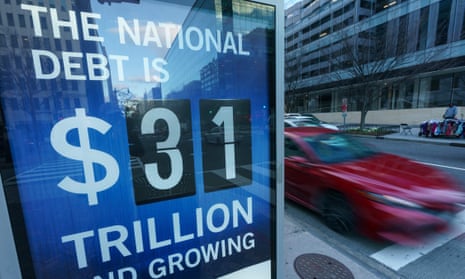Republicans aren’t going to tell Americans the real cause of our $31.4tn debt

The rich used to pay taxes. Now they loan money to the US government – at a profit that everyone else pays for

The dire warnings of fiscal hawks are once again darkening the skies of official Washington.
They’re demanding that the $31.4tn federal debt be reduced and government spending curtailed – thereby giving cover to Republican efforts to hold America hostage by refusing to raise the debt ceiling.
It’s always the same when Republicans take over a chamber of Congress or the presidency. Horrors! The debt is out of control! Federal spending must be cut!
When they’re in power, they rack up giant deficits, mainly by cutting taxes on corporations and the wealthy (which amount to the same thing, since wealthy investors are the major beneficiaries of corporate tax cuts).
Then when Democrats take the reins, Republicans blame them for being spendthrifts.
Not only is the Republican story false, but it leaves out the bigger and more important story behind today’s federal debt: the switch by America’s wealthy over the last half century from paying taxes to the government to lending the government money.
This backstory needs to be told if Americans are to understand what’s really happened and what needs to be done about it. Republicans won’t tell it, so Democrats (starting with Joe Biden) must.
A half century ago, American’s wealthy helped finance the federal government mainly through their tax payments.
Tax rates on the wealthy were high. Under Republican president Dwight Eisenhower, they were over 90%. Even after all tax deductions, the wealthy typically paid half of their incomes in taxes.
Since then – courtesy of tax cuts under Ronald Reagan, George W Bush, and Donald Trump – the effective tax rate on wealthy Americans has plummeted.
Not only has their income tax rate dropped but other taxes that hit them hardest, such as the corporate tax, have also declined.
Even as the rich have accumulated unprecedented wealth, they are now paying a lower tax rate than middle-class Americans.
Trump’s 2017 tax cut – largely a handout to the rich – helped push the tax rate on the 400 wealthiest households below the rates for almost everyone else.
By 2018, the 400 wealthiest American households paid a lower total tax rate – including federal, state, and local taxes – than any other income group. Their overall tax rate was only 23%. It had been 70% in 1950.
Middle-class and poor families didn’t benefit from the drop in income and corporate taxes. They now pay more in payroll taxes (which finance Medicare and Social Security) than previously, so their overall taxes have remained fairly flat.
One of the biggest reasons the federal debt has exploded is that tax cuts on corporations and wealthier Americans have reduced government revenue.
In the first full year of the Trump tax cut, the federal budget deficit increased by $113bn while corporate tax receipts fell by about $90bn, which would account for nearly 80% of the deficit increase.
Meanwhile, America’s wealthy have been financing America’s exploding debt by lending the federal government money, for which the government pays them interest.
As the federal debt continues to mount, these interest payments are ballooning – hitting a record $475bn in the last fiscal next year (which ran through September). The Congressional Budget Office predicts that interest payments on the federal debt will reach 3.3% of the GDP by 2032 and 7.2% by 2052.
The biggest recipients of these interest payments? Not foreigners but wealthy Americans who park their savings in treasury bonds held by mutual funds, hedge funds, pension funds, banks, insurance companies, personal trusts and estates.
Hence the giant half-century switch: the wealthy used to pay higher taxes to the government. Now the government pays the wealthy interest on their loans to finance a swelling debt that’s been caused largely by lower taxes on the wealthy.
This means that a growing portion of everyone else’s taxes are going to wealthy Americans in the form of interest payments, rather than paying for government services that everyone needs.
So, the real problem isn’t America’s growing federal budget deficit. It’s the decline in tax revenue from America’s wealthy combined with growing interest payments to them.
Both are worsening America’s already staggering inequalities of income and wealth.
What should be done? Isn’t it obvious? Raise taxes on the wealthy.
Robert Reich, a former US Secretary of Labor, is professor of public policy at the University of California at Berkeley